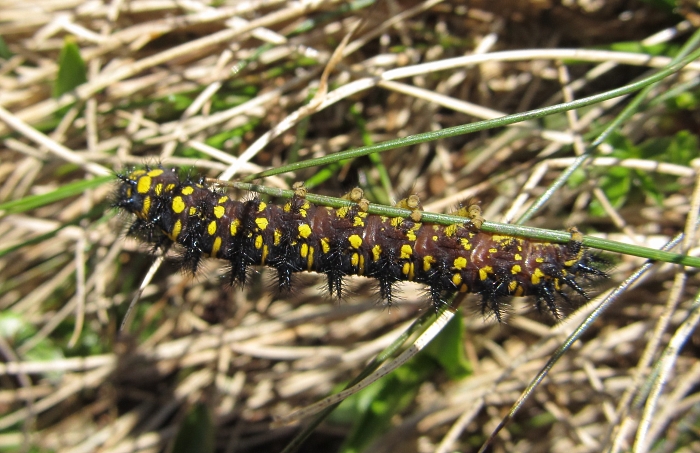Cynthia's Fritillary
Cynthia's Fritillary
I will be in the right area for this species, but too early in the year for the adult. Is anyone familiar with the needs of the larva - aspect, shelter, need for bare ground etc?
Re: Cynthia's Fritillary
Hi Chris,
I have no personal experience of the larvae of cynthia but have seen plenty of adults over the years in the Hautes Alpes and Maritime Alpes. In La Vie des Papillons, Lafranchis et al suggest that the females lay eggs on terrain with a south or south-easterly aspect, and that the larvae are fond of basking motionless on bare soil or rocks, close to the hostplant, for long periods of time. My own experience of the adults is that this species is easier to find the higher you get - 2300 metres and above in particular. Good luck with your searches - it is a larva I would like to see one day!
I have no personal experience of the larvae of cynthia but have seen plenty of adults over the years in the Hautes Alpes and Maritime Alpes. In La Vie des Papillons, Lafranchis et al suggest that the females lay eggs on terrain with a south or south-easterly aspect, and that the larvae are fond of basking motionless on bare soil or rocks, close to the hostplant, for long periods of time. My own experience of the adults is that this species is easier to find the higher you get - 2300 metres and above in particular. Good luck with your searches - it is a larva I would like to see one day!
Re: Cynthia's Fritillary
Thanks Pete. I'll give it a go!
Re: Cynthia's Fritillary
Le Col de l'Izoard,would be a good location for your search Chris , 100 yards to the west of the summit monument is a sheltered rocky gully where I have found female Cynthia's Fritillary, a likely spot to check out if you are in this locality.
https://jamesgibbs6929.zenfolio.com
https://jamesgibbs6929.zenfolio.com
Re: Cynthia's Fritillary
Best place I know for this species is the area around the refuge about 2km before Col Agnel. There are heaps of foodplant in this area, especially by the stream that runs past the refuge.
Re: Cynthia's Fritillary
Thanks folks! Both sites will in fact be really convenient!
- Padfield
- Administrator

- Posts: 8161
- Joined: Sun Nov 05, 2006 10:19 pm
- Location: Leysin, Switzerland
- Contact:
Re: Cynthia's Fritillary
Although I've never found (or indeed looked for) feeding caterpillars, I have found fully grown caterpillars heading off to pupate. This one was on 6th July at a high-altitude site and was wandering over the open hillside. It would have been easy to trample it:


There was still quite a lot of snow around that day - a problem you might face if you are there particularly early.
Guy


There was still quite a lot of snow around that day - a problem you might face if you are there particularly early.
Guy
Guy's Butterflies: https://www.guypadfield.com
The Butterflies of Villars-Gryon : https://www.guypadfield.com/villarsgryonbook.html
The Butterflies of Villars-Gryon : https://www.guypadfield.com/villarsgryonbook.html
Re: Cynthia's Fritillary
I was at this spot earlier today. The Queyras has been having western Britain's usual weather for the last few months and this is only just below the snow line. No sign of insect life but plenty of marmot, which display no road sense.
- Padfield
- Administrator

- Posts: 8161
- Joined: Sun Nov 05, 2006 10:19 pm
- Location: Leysin, Switzerland
- Contact:
Re: Cynthia's Fritillary
This is what the Swiss Bible (Les papillons de jour et leur biotopes, Ligue Suisse pour la Protection de la Nature) has to say:
'Les jeunes chenilles vivent en société dans un nid tissé. En juin, par beau temps, on en voit de plus agées, la plupart du temps en grand nombre, sur les pelouses alpines à gazon ras. Il y en a de deux grandeurs : des sujets à mi-croissance et d'autres, visiblement en fin de croissance, et dont la taille indique clairement que leur dévoloppement est bisannuel et exige deux hivernages. ... On a observé comme plante-hôte le plantain des Alpes et la violette épéronnée (Viola calcarata) ; la littérature cite aussi d'autres espèces ...'
I missed out parts about the caterpillars heading off for hibernation, and where they go, because they obviously won't be doing that now.
Guy
'Les jeunes chenilles vivent en société dans un nid tissé. En juin, par beau temps, on en voit de plus agées, la plupart du temps en grand nombre, sur les pelouses alpines à gazon ras. Il y en a de deux grandeurs : des sujets à mi-croissance et d'autres, visiblement en fin de croissance, et dont la taille indique clairement que leur dévoloppement est bisannuel et exige deux hivernages. ... On a observé comme plante-hôte le plantain des Alpes et la violette épéronnée (Viola calcarata) ; la littérature cite aussi d'autres espèces ...'
I missed out parts about the caterpillars heading off for hibernation, and where they go, because they obviously won't be doing that now.
Guy
Guy's Butterflies: https://www.guypadfield.com
The Butterflies of Villars-Gryon : https://www.guypadfield.com/villarsgryonbook.html
The Butterflies of Villars-Gryon : https://www.guypadfield.com/villarsgryonbook.html
Re: Cynthia's Fritillary
Thanks Guy. I hadn't realised they ate violets. There were plenty of those about, in flower too, but little or no sign of the plantain. In British terms it is late April in the valley bottoms, with orange tips, green hairstreak and PBF about.
Re: Cynthia's Fritillary
Thanks for the forewarning, Chris. I'll be over there in less than a fortnight so I'll expect the worst!!
